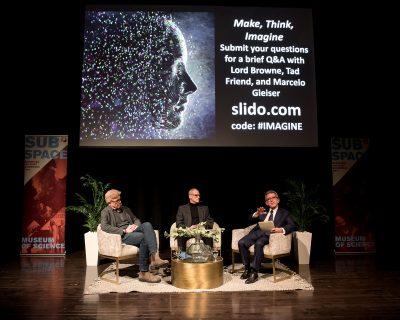While scientists have been celebrating current technological advancements, several humanists have become increasingly concerned about their impacts.

This ever-growing debate between science and philosophy was explored by three intellectual speakers at the Museum of Science Wednesday in an event called “Make, Think, Imagine: Where is Technology Taking Us?”.
While at the museum, former CEO of BP John Browne, Lord Browne of Madingley, said engineering significantly improves the human condition and effectively creates civilization. Browne said that despite the fears surrounding scientific progress, the aim is to keep innovating.
“We have created the means whereby to improve the human lot on average enormously,” Browne said during the first hour of the event. “[We can] give people [a] quality of life — or a life.”
Tad Friend, writer for The New Yorker, mentioned at the talk that there is a lack of regard for the implications of technological developments. Specifically, Friend referenced technology companies, such as Google and Facebook that have surrendered their dedication to morals to their desire for power.
“Technology is getting more and more powerful,” Friend said in an interview after the talk. “We need people who are not just simply working to get it done, but we need people who think about what will happen if it would get done.”
While he appreciates the ease at which cell phones allow access to information and remains excited for several upcoming inventions such as self-driving cars, Friend said it wouldn’t hurt to question their effects.
Using the example of the cell phone, Marcelo Gleiser, a Dartmouth College physicist and the moderator of the event, called attention to one such negative effect of technology: isolation.
“Cellphones are extremely useful as tools to get news and program life, but [they] could also be objects of alienation,” Gleiser said in an interview after the event. “Humans need connectivity on a flesh-and-blood level.”
Gleiser said this loss of human touch is particularly apparent with the infiltration of technology within the medical field. With the soaring knowledge of artificial intelligence, he said many scientists believe machines very well may replace clinicians and surgeons.
Jay Patel, 22, of Westfield, Mass., said he believes AI can pose benefits, but said it depends on the context and how it is used.
“When it comes to surgery, I think AI can help,” Patel said in an interview at the event. “But having physicians come and take care of you and diagnose you one-on-one is a little more comfortable than inputting data into a machine to help determine what you have.”
Browne said he believes that providing emotional support and empathizing were and are not a goal of AI.
“[AI] is no attempt at creating new brains,” Browne said in his talk. “We want to hold on to exceptional abilites of human beings.”
Friend said he “is a little bit pessimistic” when he thinks of the future of the world with technology.
“I am concerned about people who work in AI,” Friend said in an interview after the talk. “They did a survey of experts and they felt the average time people thought AI would be as smart as humans is 2047.”
As a scientist, Gleiser said he understands that the reason for neglecting agreed-upon rules is often an isolated drive to reach technological goals.
“The danger that often happens in technology is that sometimes you look at a scientific challenge as a kind of a game and you want to get to the end of it,” Gleiser said in an interview after the event. “You forget that … what you’re doing is not in a vacuum, it’s connected to society.”
Gleiser and Friend both promote the idea of establishing a set of standards to address potential dangers. By consulting ethicists and philosophers, scientists can gain an understanding of their products’ multidimensional impacts, Gleiser said.
Merging humanistic and scientific ways of thinking during formative education may prove useful in creating a future that includes technology and values, Gleiser said. This change can be implemented by making students, beginning in middle school, take philosophy classes and evaluate the impacts as well as the facts of history, he said.
“If you really want the world to move forward using technology mostly for the good,” Gleiser said in an interview, “we really need to take a leap into understanding how philosophy can be helpful for society.”





















































































































